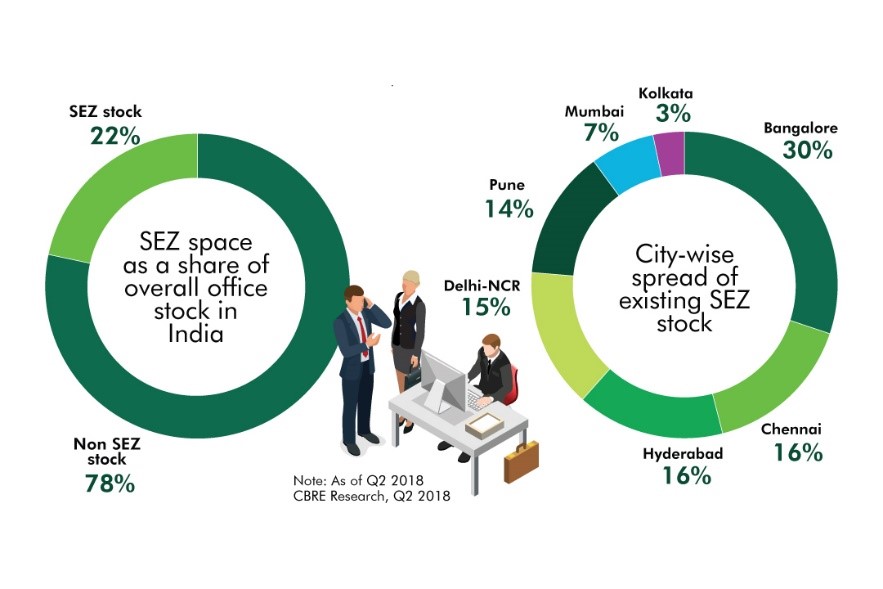Report
Almost 80% Occupiers Are Expected To Expand Their Real Estate Portfolio In India: CBRE Report


70% Occupiers to prioritize installation of PropTech and Innovation in workplace Strategies
- A paradigm shift in RE priorities was revealed in over three years: in 2016, rental/ CAPEX costs were the most critical factors affecting future RE management.
- Other key takeaways of the report were:
- Almost 80% respondents intend to expand office portfolio, 90% plan to continue headcount growth over the next two years
- More than half of the respondents listed software development, research & development, knowledge centre as most preferred business functions for expansion over the next two years
- More than half of the respondents identified expansion as their top RE strategy over the next two years
New Delhi, 7th March 2019: CBRE South Asia Pvt. Ltd, India’s leading real estate consulting firm today announced the findings of its latest report titled, “INDIA OFFICE OCCUPIER SURVEY (IOOS) 2019: WHAT DOES THE FUTURE HOLD?”. The results of this year’s survey highlight the changing priorities of occupiers – a result of which are the strategies occupiers are executing for the business lines and employees they serve. It also highlights how real estate executives are aware of the operating business environment and intend to balance today’s requirements for efficient and experiential workplaces with that of future expectations.
Anshuman Magazine, Chairman, India & South East Asia, CBRE said “Corporate real estate in India is transforming, with focus on strategic models, technology and workplace innovation. Occupier intention of expanding office portfolios highlights the changing landscape in the operating business environment. The priority also lies in balancing today’s requirement for efficient and experiential workspaces with that of the industry’s future expectations.”
As per the findings, the intention to expand the office portfolio by occupiers in India is much higher than APAC, where only 45% of respondents (in comparison to India 79%) plan to increase their corporate real estate portfolio.
As per the report, office occupiers are currently facing three key challenges in India:
- Changing nature of jobs: Jobs are becoming increasingly digitised in the country, resulting in occupiers need to attract/retain adequately skilled i.e. ‘right’ talent
- Macro RE challenges: Our survey revealed that the top challenges faced by office occupiers in India mainly related to the lack of readily-available space to move in
- Building level challenges: Occupancy cost, parking, disaster readiness of buildings etc. were the key building level challenges identified by office occupiers.
For instance, on challenges within a building, nearly 70% of respondents across most tenant sectors listed increasing occupancy costs as the biggest challenge while locating within a building. About 60% of tech and BFSI respondents viewed parking as a key challenge. Those with long-term plans of staying in the same premises – i.e. half of the large-sized tech/BFSI respondents – listed lack of periodic building and infra upgrades as an impediment for smooth office operations. Most global companies or domestic firms with a large-sized office portfolio faced disaster readiness and safety & security as bottlenecks.
The findings of the survey also suggested that majority of the respondents have plans of expanding headcount growth in India over the next two years. In fact, the headcount growth is expected to be higher than office portfolio growth over the next two years. Moreover, more than 70% of respondents cited that the main reason for increase in headcount would be linked to their expansion plans in tier I cities specifically – underlining their belief in being able to recruit the right talent in these locations.
| Office Occupiers in India: Projected Headcount Growth in the next two years |
  |
| Source: IOOS 2019; CBRE Research, Q1 2019 |
|
|
| Source: IOOS 2019; CBRE Research, Q1 2019 |
Ram Chandnani, Managing Director, Advisory & Transactions Services, India, said, “Future-proofing a dynamic RE portfolio today requires strong alignment between the goals of an organisation and expectations of talent, business and real estate. Change in occupier preferences will encourage new forms of asset configuration/workspace design and place a range of new demands on management of real estate assets, namely a shift towards better service levels and more consumerisation – effectively providing bespoke workplace solutions. “
CBRE released a three-part global thought series ‘Better Business Performance Through Better Workplace Performance’ on the workplace strategies that optimise an organisation’s strategic goals:
- Aligning the workforce with the workplace: Strategies to find optimal locations along with attracting, engaging and retaining the ‘right’ talent
- Designing the workplace experience: Best practices in workplace design to enhance the employee experience
- Building competitive advantage: Real estate decisions for creating the best competitive advantage for occupiers
For instance, ‘building competitive advantage’ is in line with placemaking, which essentially means integrating design, amenities and communities to create a unique space where people want to be. The survey results revealed that occupiers in India are increasingly building competitive advantage by adopting placemaking – installing measures for saving employees time, implementing health and wellness programs, tech – enhancing property management and using ‘smarter’ spaces.
These changes will encourage new forms of asset configuration/workspace design and place a range of new demands on management of real estate assets, namely a shift towards better service levels and more consumerisation – effectively providing bespoke workplace solutions. CBRE advises occupiers to adopt a few strategies for de-risking various uncertainties
| De-risking uncertainties
|
  |
| Source: IOOS 2019; CBRE Research, Q1 2019 |
C-suite is increasingly aware that it is data that is driving both RE and business strategies and is taking steps for making more informed decisions. In CBRE’s opinion, this process would be the most successful when it is from the top and recognized for what it is: ‘tremendous organisational transformation effort’.
-



 News3 weeks ago
News3 weeks agoKW Delhi 6 Mall Onboards New Brands
-



 News3 weeks ago
News3 weeks agoManasum Senior Living Launches IKIGAI GOA, A Senior Living Community in North Goa, in collaboration with Prescon Homes
-



 News2 weeks ago
News2 weeks agoGodrej Properties Sells Rs 3k cr+ Homes of Godrej Zenith, Gurugram, within 3 days
-



 News3 weeks ago
News3 weeks agoBridging India Divide: Top 5 Tier- 2 Cities to Focus On
-



 News3 weeks ago
News3 weeks agoCommercial Realty Gets Tech Savvy: Fast Construction, Enhanced Convenience
-



 News3 weeks ago
News3 weeks agoMultipoint Connection – A Definite Boon
-





 News2 weeks ago
News2 weeks agoRBI’s Status Quo on Key Policy Rates to Help Maintain the Real Estate Growth Momentum, Say Industry Stalwarts
-





 News3 weeks ago
News3 weeks agoSacred Cities See a Retail Boom as Spiritual Tourism Surge: CBRE Report























